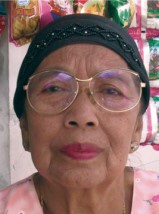Patani-Maba in Indonesia

Photo Source:
Copyrighted © 2026
Anonymous All rights reserved. Used with permission |
Send Joshua Project a map of this people group.
|
| People Name: | Patani-Maba |
| Country: | Indonesia |
| 10/40 Window: | Yes |
| Population: | 19,000 |
| World Population: | 19,000 |
| Primary Language: | Patani |
| Primary Religion: | Islam |
| Christian Adherents: | 0.00 % |
| Evangelicals: | 0.00 % |
| Scripture: | Translation Started |
| Ministry Resources: | No |
| Jesus Film: | No |
| Audio Recordings: | Yes |
| People Cluster: | Maluku-Northern |
| Affinity Bloc: | Malay Peoples |
| Progress Level: |
|
Introduction / History
The Patani-Maba live in the eastern regions of Halmahera Island in the province of North Maluku. The provinces of North Maluku and Maluku were created when the province of Maluku was divided in 1999.The Maluku Islands are an archipelago consisting of over one thousand islands and covering the area between Sulawesi and New Guinea and between the island of Timor and the Philippines. The Maluku Islands are commonly known as the Spice Islands, named for their critical role in the spice trade between Asia and Europe in earlier centuries. In fact, when Columbus unexpectedly found America, he was looking for a way to travel to these islands by going west rather than east from Europe. The Patani-Maba dominate the southeast peninsula of Halmahera.
What Are Their Lives Like?
Most Patani-Maba make their living as farmers or fishermen, and some work in the wood processing industry. Most still practice a migratory pattern of agriculture; moving from time to time to find better sustenance after they have depleted the soil's fertility in one area. Their pattern of dry rice farming is like that of most other peoples in the region using a "slash-and-burn" method. This method receives its name from the practice of opening new farmland by cutting down trees and burning the underbrush. The initial clearing of the field is accomplished with the help of a large group of neighbors. This system of mutual cooperation among neighbors is called gotong royong. This pattern is very common throughout Indonesia and is not only used for clearing of new land, but also for building houses, and holding weddings, funerals, and other activities. A celebration of the importance and value of gotong royong is seen in the movements of the Cawa dance. Patani-Maba society utilizes a clan system. Life mates must be found outside one's own clan. After marriage, a couple initially lives near the husband's family and then move to a new area when they are more established.
What Are Their Beliefs?
The Patani-Maba are followers of the Islamic religion. The Islamic religion exerts great influence on Patani-Maba culture. This influence is evident in religious exercises such as the Salaijin dance, recitation of the Koran (Islamic Holy Book), and a debus, a performance involving a display of magic. The debus performance is interrelated with their ancient system of supernatural power, which includes stabbing themselves, yet suffering no harm.
What Are Their Needs?
To make their communities more productive, the Patani-Maba need better community and resource development, including introduction to the more efficient use of appropriate technology. They lack formal and vocational education and lack opportunities to improve their skills. Electricity and clean water are also not fully available, which hampers development. Finally, health care is limited, in part due to the relative inaccessibility of their area.
Prayer Points
Pray for the Lord to thrust out loving workers to the Patani people of Indonesia.
Pray for their elders to have dreams and visions that open their hearts to the Lord of lords.
Pray for a spiritual hunger that will open their hearts to change.